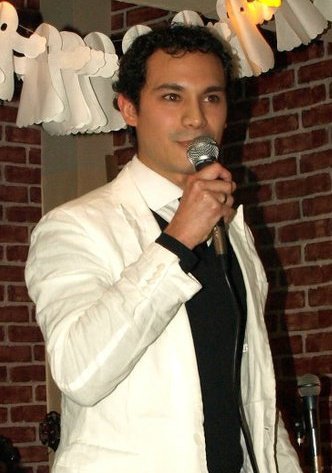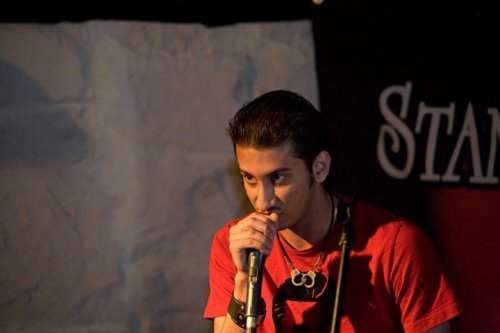Expatriate comics create burgeoning scenes in Seoul, Busan
When it comes to entertainment in Korea, live comedy would seem to require a dedicated scene for expats more than most. Few things are as easily lost in translation as humor.
Luckily for those with a funny bone, the live comedy scene here has grown from humble beginnings into something vibrant.
“I’d say in the last year and a half since I’ve been performing, things have improved in all aspects,” says Albert Escobedo, a regular performer on the stand-up scene. “The crowds are better, the comedians are better, and the venues are better.”
Escobedo, a Chicagoan who now teaches English in Ilsan, first got involved in stand-up in Korea during the early days of “Stand-up Seoul,” a comedy night started in 2009 by Brian Aylward. From the Stand-up Seoul monthly open-mic nights that he says he has missed “maybe three” times, Escobedo has branched out to other gigs.
“I perform with Stand-Up Seoul Showcase, where a selected few of the best comedians go to different parts of Seoul or other cities in Korea to perform comedy. At the open-mics, you get 3-7 minutes to perform your material. At the Showcase shows, you get more time, anywhere from 10-45 minutes depending on if you are a featured act or the headliner.”
Escobedo says Aylward turned the scene around in Korea. Aylward has since returned to his native Canada to pursue a comedy career there, but the number of comedy options for expats has continued to grow in his absence.
 |
Albert Escobedo |
In Itaewon alone, Tony’s, Roofer’s and Rocky Mountain Tavern all hold regular comedy nights; Busan has its own monthly open-mic night with “HaHa Hole”; and in recent weeks gigs have traveled to Traveler’s Bar & Grill outlets in Daegu and Seongnam.
“If you wanted to, you could see it (expat comedy) at least five or six times a month,” says Ohio-native Jessica Coyle, who performs routines several times a month in Seoul.
Although the typical audience is overwhelmingly expat, it is not unusual to have a few Koreans in the crowd, according to fellow Stand-up Seoul regular and student Fahad Mutlaq.
“When I perform in a normal open-mic, I usually spot one or two tables with Koreans who don’t speak English, or I’m going too fast for them. I always include them with the little Korean that I know, or do some impressions from Korean culture and it usually gets their attention. I notice them after I’m off the mic coming to me saying they had a good time,” says the 22-year-old from Saudi Arabia.
Both Mutlaq and Escobedo seem to agree that Koreans have their own particular sense of humor.
 |
Fahad Mutlaq. (Michele Farley) |
“From what I noticed from constantly watching Korean comedy shows, (it is) that rarely the joke is spoken, it is acted,” says Mutlaq.
But Coyle says that even fluency in a language is not necessarily enough to get a joke across to a crowd of a different nationality ― as one Korean member of her comedy group found when he struggled to get his head around the routines, despite being fluent in English.
“He was unable to understand the comedy because it is so cultural … comedy is the last thing anyone learns in any language. I’m a fluent French speaker and I can’t make a joke in French,” she says.
Despite being a relative niche, Korea’s comedy scene is not restricted to stand-up. Since 2007, Seoul City Improv comedy troupe have performed around Korea, taking their shows as far afield as Tokyo and Hong Kong.
“The events consist of, usually, a mix of short-form improv games like you might see on ’Whose Line is it Anyway?’, as well as what’s called long-form improv, which is where (for) 30 minutes you take an audience suggestion or two and you sort of improvise an entire play,” explains SCI leader Mark “X” Guinn.
Mark says that as with stand-up, improvised comedy now has a strong footing here.
“The improv scene is really big as well. We have open rehearsals every Sunday and we get 20 or so people just to go to these rehearsals. And our shows usually have a great deal of support ― at least, at a decent venue, 100 or so people. Often it is 150,” he says.
So, sketches or stand-up, is there anything expats interested in getting into comedy should be doing in particular? Mutlaq has some advice.
“Do a couple of small shows and filter what you got from jokes and then try a bigger room, because most people think that if the joke is funny one time, it’s always funny, which is not true,” he says.
“And even if it’s funny they don’t take in account that the presentation matters, the way you say the joke is important, so if you are a good joke writer, try improving the presentation skills and anticipating the crowd reaction.”
Be it as a spectator or performer, Escobedo can’t recommend comedy for expats more highly.
“In South Korea more than anywhere else I’ve ever been, do expats need an outlet. Comedy is the perfect outlet. Laughter makes you feel good about where you are, and forget your troubles,” he says.
For him, there is no better rush than performing.
“And making people laugh is the best high I’ve ever felt, but I’ve never done heroin ... as long as there isn’t any heroin in South Korea, stand-up comedy is here to stay.”
By John Power (
john.power@heraldcorp.com)
Regular and upcoming comedy events
Itaewon, Seoul
Tony’s Aussie Bar & Bistro ― Open-mic stand-up, every Wednesday, 9 p.m.
Roofer’s ― General open-mic first and third Sunday of every month, 8 p.m.
Roofer’s Comedy Night, every third Friday of the month, 10 p.m.
SCI show, Friday, April 1st at 8 p.m.
Rocky Mountain Tavern ― Stand-up Seoul open-mic, first Thursday of the every month, 9 p.m.
Busan
“Haha Hole” at Soul Trane PNU ― Open-mic stand-up first Friday of every month, 10 p.m.
Daegu
Buy the Book Cafe ― SCI joint show with the Daegu Theatre Troupe on Saturday, March 26, 9 p.m.
Cheonan
SCI show, Saturday, April 16. Venue and time TBC.
Daejeon
Santa Claus ― Saturday, April 9, 8 p.m.









